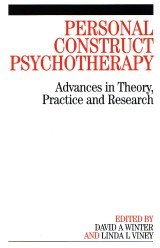Details

Personal Construct Psychotherapy
Advances in Theory, Practice and Research1. Aufl.
|
48,99 € |
|
| Verlag: | Wiley |
| Format: | |
| Veröffentl.: | 15.09.2008 |
| ISBN/EAN: | 9780470713761 |
| Sprache: | englisch |
| Anzahl Seiten: | 448 |
DRM-geschütztes eBook, Sie benötigen z.B. Adobe Digital Editions und eine Adobe ID zum Lesen.
Beschreibungen
In the half century that has passed since George Kelly put forward his psychology of personal constructs, there have been major advances in the form of psychotherapy derived from his theory. This book presents developments in the personal construct theory perspective on psychological disorders and their treatment in the context of contemporary issues in psychotherapy; illustrates the diverse range of personal construct psychotherapy approaches that have been devised for a wide range of clinical problems; and indicates the growing evidence base for these approaches. <p> It contains contributions from most of the leading international practitioners in the field. It will not only be of interest to psychotherapists, other clinicians, academics, and students who are already familiar with personal construct theory or constructivism, but also to those who are seeking a therapeutic approach which is integrative but has a clear theoretical rationale, and which is able to combine humanism with rigour. </p>
Foreword. <p>Preface.</p> <p><b>Part One: General Principles of Personal Construct Psychotherapy</b>.</p> <p><b>Chapter 1</b> Personal construct psychotherapy meets constructivism: convergence, divergence, and possibility. <i>(Jonathan D Raskin, Kristian David Weihs and Laurie Ann Morano).</i></p> <p><b>Chapter 2</b> Psychological disorder and reconstruction. <i>Beverly M Walker and David A Winter).</i> </p> <p><b>Chapter 3</b> Kellyan invalidation, attachment theory and the construct of 'control' in psychopathology. <i>(Sandra Sassaroli, Roberto Lorenzini and Giovanni Maria Ruggiero).</i></p> <p><b>Chapter 4</b> Reconstructing in relating: the psychotherapeutic relationship from a personal constructivist perspective. <i>(Gabriele Chiari and Maria Laura Nuzzo).</i></p> <p><b>Chapter 5</b> Encountering an other: experiential personal construct psychotherapy. <i>(LM Leitner, AJ Faidley, Donald Dominici, Carol Humphreys, Valerie Loeffler, Mark Schlutsmeyer and Jill Thomas).</i></p> <p><b>Chapter 6</b> A personal construct approach to narrative and postmodern therapies. <i>( Luis Botella, Sergi Corbella, Tary Gomez, Olga Herrero and Meritxell Pacheco).</i></p> <p><b>Chapter 7</b> Personal construct psychotherapy: epistemology and practice. <i>(Greg J Neimeyer, Jocelyn Saferstein and Wade Arnold).</i></p> <p><b>Chapter 8</b> Techniques of personal construct family therapy. <i>(Harry Procter).</i></p> <p><b>Part Two: Specific Clinical Problems</b>.</p> <p><b>Chapter 9</b> Growing through grief: constructing coherence in narratives of loss. <i>(Robert A Neimeyer).</i></p> <p><b>Chapter 10</b> Deliberate self-harm and reconstruction. <i>(David A Winter).</i></p> <p><b>Chapter 11</b> Resolution of dilemmas by personal construct psychotherapy. <i>(Guillem Feixas and Luis Angel Saul).</i></p> <p><b>Chapter 12</b> From constriction to experimentation: a personal construct approach to agoraphobia. <b>David A Winter and Chris Metcalfe).</b></p> <p><b>Chapter 13</b> Psychotherapy with traumatised clients: a constructivist framework for healing. <i>(Kenneth W Sewell).</i> </p> <p><b>Chapter 14</b> Personal constructions in therapy with child sexual abuse survivors. <i>(Christopher R Erbes and Stephanie Lewis Harter).</i></p> <p><b>Chapter 15</b> The challenge of borderline personality disorder: a personal construct group psychotherapy approach. <i>(Ian Gillman-Smith and Sue Watson).</i></p> <p><b>Chapter 16</b> Eating disorders. <i>(Eric Button).</i></p> <p><b>Chapter 17</b> Working with people who hear voices. <i>(Diane Allen).</i></p> <p><b>Chapter 18</b> Issues in forensic psychotherapy. <i>(James Horley).</i></p> <p><b>Chapter 19</b> The experience of anger. <i>(Peter Cummins).</i></p> <p><b>Chapter 20</b> Kids' stuff. <i>(David Green).</i></p> <p><b>Chapter 21</b> Personal construct group work with troubled adolescents: unhelpful and helpful forces. <i>(Deborah Truneckova and Linda L Viney).</i></p> <p><b>Chapter 22</b> Towards a personal construct sex therapy. <i>(David A Winter).</i></p> <p><b>Chapter 23</b> Looking forward towards the end – working with older people. <i>(Sally Robbins).</i></p> <p><b>Chapter 24</b> Personal construct group work with women with breast cancer: role relationships and support. <i>(Lisbeth G Lane and Linda L Viney).</i> </p> <p><b>Chapter 25</b> Personal construct workshops for women experiencing menopause: reconstruction and validation of non-verbal, preverbal and verbal construing. <i>(Heather Foster and Linda L Viney).</i></p> <p><b>Part Three: Evidence Base</b>.</p> <p><b>Chapter 26</b> A process and outcome study of personal construct, cognitive and psychodynamic therapies in a National Health Service setting. <i>(Sue Watson and David A Winter).</i></p> <p><b>Chapter 27</b> The effectiveness of personal construct psychotherapy: a systematic review and meta-analysis. <i>(Linda L Viney, Chris Metcalfe and David A Winter).</i> </p> <p><b>Appendix. An Introduction to Personal Construct Theory</b>.</p> <p>References.</p> <p>Author Index.</p> <p>Subject Index. </p>
<p><strong>David Winter</strong> is based at the University of Hertfordshire and also consults at Barnet, Enfield and Haringey Mental Health trust. <p>Linda Viney is based at the University of Wollongong.
In the half century that has passed since George Kelly put forward his psychology of personal constructs, there have been major advances in the form of psychotherapy derived from his theory. This book presents developments in the personal construct theory perspective on psychological disorders and their treatment in the context of contemporary issues in psychotherapy; illustrates the diverse range of personal construct psychotherapy approaches that have been devised for a wide range of clinical problems; and indicates the growing evidence base for these approaches. <p>It contains contributions from most of the leading international practitioners in the field. It will not only be of interest to psychotherapists, other clinicians, academics, and students who are already familiar with personal construct theory or constructivism, but also to those who are seeking a therapeutic approach which is integrative but has a clear theoretical rationale, and which is able to combine humanism with rigour. </p>
Diese Produkte könnten Sie auch interessieren:

The Wiley-Blackwell Handbook of Childhood Social Development

von: Peter K. Smith, Craig H. Hart

136,99 €
















